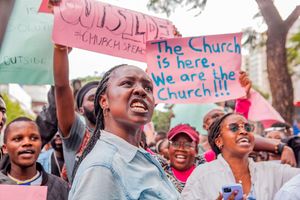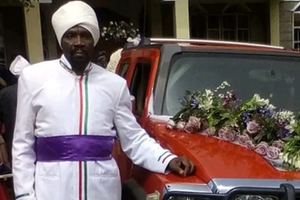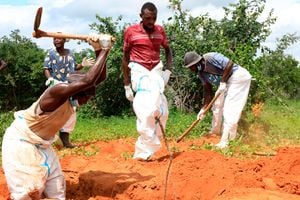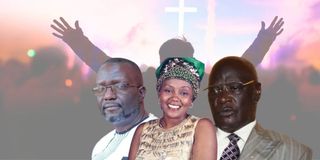
Pastor turned book publisher Edward Ondachi (left), Princess Faridah and Archbishop Arthur Kitonga.
Princess Faridah was born and raised a Muslim. She later made a name in Kenya and internationally, especially in the Gulf, as the undisputed queen of the waist-wiggling chakacha dance.
All this changed when she had an encounter on an aeroplane. She narrates in her book, ‘The New Me,’ that after that encounter with Jesus, she became born again. As a new believer, she sought out a well-established man of God, who would disciple and teach her the ways of the new faith she had embraced.
“Archbishop Arthur Kitonga of the Redeemed Gospel Church is my spiritual father. He is my covering. He has been patient and understanding. He knew change does not happen overnight. He pushes me to be the best I can be in God and even wrote the foreword to my first book The New Me,” she says.
Faridah, who is married to Isaac Migwalla and runs the Migwalla Revivals Ministry alongside him, says: “A spiritual father gives you your identity the same way you draw your identity from your natural father. For example, if he is an apostle or a prophet, you are most likely to follow in his footsteps. He offers you spiritual protection and covering, the danger of being without one is seen in the story of the Prodigal Son and the fate he suffered when he went out of his father’s covering.”
The issue of a spiritual father is a delicate one and it is an ongoing debate in Christendom. While some say that all believers require a spiritual father, others are of the opinion that nothing is needed beyond God the Father and the Son.
Those supporting the concept talk of the prominent role these people play in their lives — as Princess Faridah says — while those opposed see the whole concept as nothing more than a tool of manipulation.
In the latter group, it is such attachment to spiritual fathers that have borne the “mummy and daddy” or “mum and dad” syndrome in churches where people have been taken care of.

Gospel Singer Princess Farida.
Over the ages, some unscrupulous church or sect leaders, having captured the minds of their followers, have gone ahead to force them into acts that run contrary to Christian belief and practice.
For example, in March 2000, the world was thrown into shock when it woke to the news that some 700 people had been burnt to death in Kanungu, south-western Uganda.
The deceased were all members of the Movement for the Restoration of the Ten Commandments of God, a doomsday cult that believed the world would come to an end at the turn of the millennium.
The faithful had been drawn by the charismatic leaders Credonia Mwerinde, a former bartender and sex worker, and ex-government employee Joseph Kibwetere, who said that they had had visions of the Virgin Mary in the 1980s.
The two leaders, having promised the faithful a direct entry into heaven then locked them inside the church and set it ablaze. It is believed that Mwerinde and Kibwetere escaped their fiery heavenly journey.
The Ugandan tragedy may be on the extreme end of the scale, but this does not take away the fact that some people have suffered at the hands of their spiritual fathers or mothers, ending up leaving the church altogether.
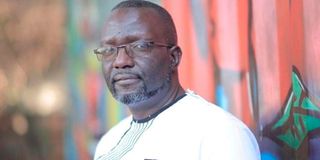
Reverend Edward Ondachi is a pastor, writer and painter.
Pastor turned book publisher Edward Ondachi agree that that spiritual fatherhood is a biblical concept. He bases his case on 1 Timothy 1:2 where Paul says: “I am writing to Timothy, my true son in the faith. May God the Father and Christ Jesus our Lord give you grace, mercy, and peace.”
Mr Ondachi, who has been a pastor at Nairobi Baptist Church, Mavuno and Mamlaka Churches, says that when the spiritual father/son grows organically over time, it is viewed with great favour both in the New and Old Testaments. But he warns that there lurks a danger when the concept is taken out of context with the attendant potential of being misused.
“However ‘spiritual parenting’ is a new terminology and should be viewed with a measure of suspicion because, for one, it is often done by a pastor who already has spiritual authority over the said ‘spiritual child’,” he says.
Pastor Ondachi adds: “The term mummy or daddy is not just unnecessary it is also absent in the Bible. The spiritual child is expected to follow instructions ‘without questioning’. This opens up the whole relationship to abuse and is an avenue for wealth creation for spiritual ‘mummies and daddies’.”
He says that such an arrangement is a clear abuse of scriptures since more and more churches in Kenya have started to adopt the practice in order to gain wealth and avoid scrutiny and accountability both financially and for what they teach.
“A title of mummy or daddy on top of pastor becomes a double authority which is not in my view from God,” says Pastor Ondachi.
Ondachi’s position is supported by Maureen Mhando, is a born-again Christian and a former TV journalist and newscaster. She says the concept has been abused and stresses that for her the reference to father and mother are only reserved for her biological parents.
“Our relationship with those above us on matters spiritual should be to respect them. This idea of calling someone who is not your parent your ‘dad’ or ‘mum’ is wrong in so many aspects. It gives those being called such names to have some manipulative control over those they lead. You are either a pastor or a bishop period. It is also clear in the bible when Jesus tells us not to refer to anyone else as father apart from our Father in heaven,” she says.
According to Ms Mhando, she has heard of cases where such spiritual parents intrude into the very lives of their so called ‘children’ wanting to make decisions on all aspects of their lives. In the end, such ‘children’ become zombies, who cannot do anything apart from what they are told by their spiritual parents.
Faridah admits that she has several spiritual ‘children’ who look up to her for guidance.
“I am a spiritual mother to so many people. I am closer to some of them than their biological mothers. They find it so easy to share with me their deep issues and I think it's because I am patient with them. I give them a listening ear, encourage them, pray for them and make them discover their potential and know their worth. It's always a joy to see God transform them and become who God called them to be,” she says.
However, she maintains that such people must strive to know the word of God for themselves. “They should know the word of God for themselves so that they can measure everything they being preached. Your personal knowledge and growth in God is very important and that’s why one must cultivate a personal relationship with God,” she says.
Australian based author Winnie Thuku-Crag, also a believer and a commentator on contemporary Christian issues, traces the whole idea to early Christianity where she says the doctrine of spiritual fatherhood and motherhood was rampant in the Catholic church adding that it was one of the reasons that led to the reformation. She says that later, the doctrine was re-introduced to the protestants by the movement.
“The Shepherding Movement was the largest influencer of the Charismatic Renewal in the 1970s and 1980s. It's probably one of the biggest movements in the church history. As the name implies, the movement taught that other than Jesus, every Christian had to have a human shepherd and that all of one's major life decisions were to be submitted to this shepherd. The movement operated with a hierarchical structure where authority flowed downwards and submission and accountability, upwards,” she says.
She explains that the doctrine of spiritual coverings and covenant relationships were taught as being permanent and one was not supposed to walk away from them.
“This concept of spiritual families is what ended up enslaving people since no matter how bad the dynamics within the churches got, the leaders were the final authority on spiritual matters, and aggrieved members could not walk away as it was made clear that they were breaking a covenant with God. Their only options were to stay or to stay," she says.
tomosanjo@yahoo.com

